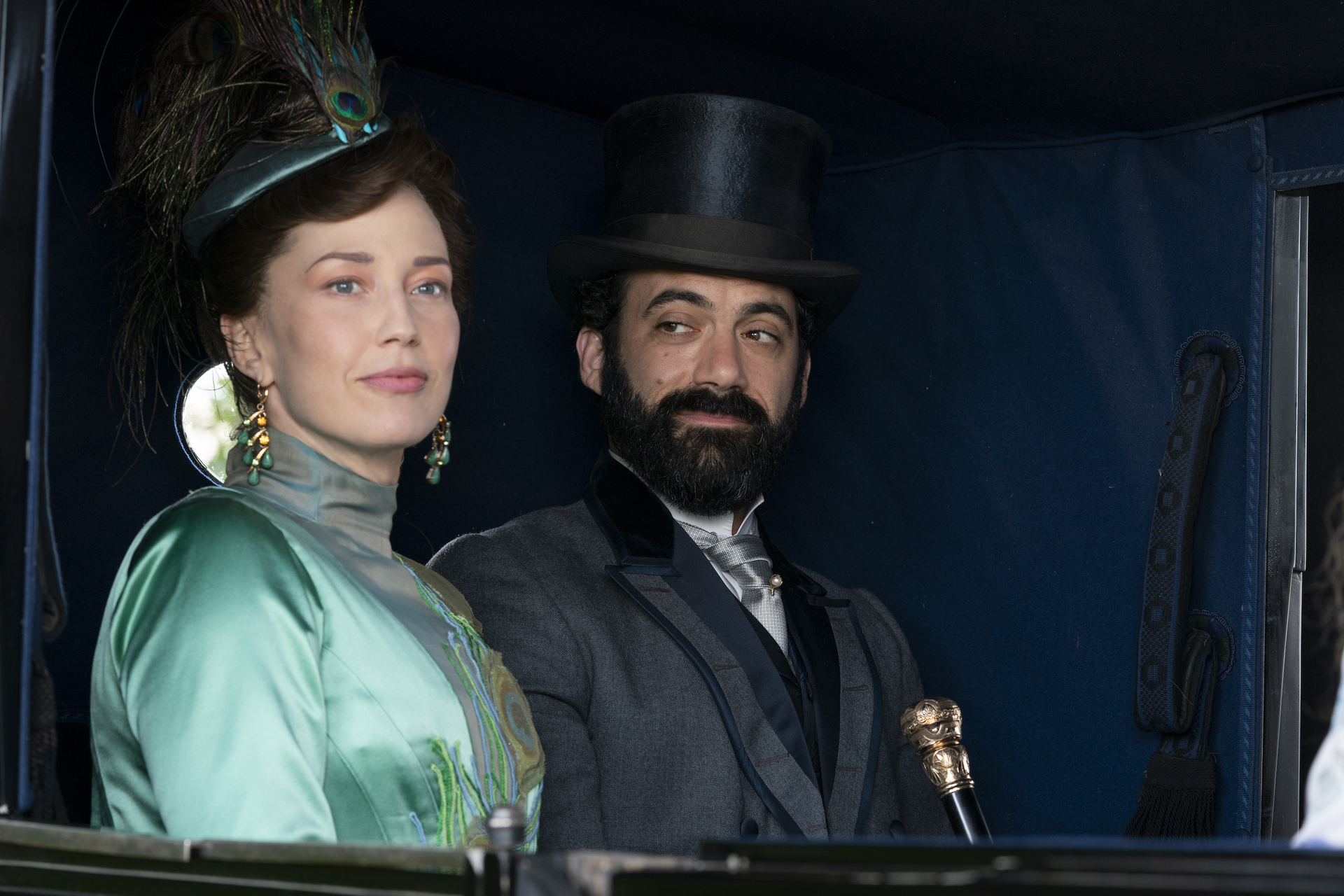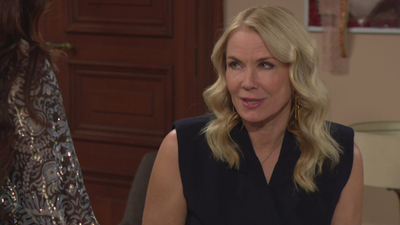What to Watch Verdict
The Russells prove they are not to be trifled with, which adds momentum to the second episode.
Pros
- +
Carrie Coon and Morgan Spector's chemistry
- +
A tight 46-minute runtime
- +
Costume designer Kasia Walicka-Maimone's stunning creations (particularly Bertha's peacock day dress)
- +
Some intriguing mysteries
Cons
- -
Some of the historical references are a little clunky
- -
This show is not subtle when it comes to its themes
This post contains spoilers for The Gilded Age season 1 episode 2. Read our The Gilded Age season 1 episode 1 review here.
Marian Brook (Louisa Jacobson) is quickly learning the rules of living on East 61st Street in The Gilded Age while subtly seeing how far she can step outside the lines set by her Aunt Agnes (Christine Baranski). It is a world that is more expansive than her rural Pennsylvania life with an ever-growing closet of luxurious garments. However, every person she converses with is measured against a strict rubric of suitability. It should come as no surprise that the two men who have so far caught her eye are not worthy suitors for a woman with her name. Or at least this is how Aunt Agnes judges these potential matches.
“Money Isn’t Everything” is both the title of the episode and a line that is uttered twice as a dismissal. The dialogue is not subtle and by now it is very clear that characters like Agnes van Rhijn do not take lightly to the threat of the new. Meanwhile, the next generation is less inclined to observe these parameters, and it isn’t only Marian who is embracing the new neighbors.
Agnes’ son Oscar (Blake Ritson) has already become acquainted with Larry Russell (Harry Richardson) in Newport and earns his mother’s scorn when he invites Larry across the to their abode. It is his interest in Gladys (Taissa Farmiga) that is particularly curious and Marian thinks he is wooing her for her wealth. We know the reason why John Adams (Claybourne Elder) was lukewarm toward Marian is because he is sleeping with Oscar. Therefore his interest in Gladys is not likely to be romantic, but there appears to be more to this than wealth.
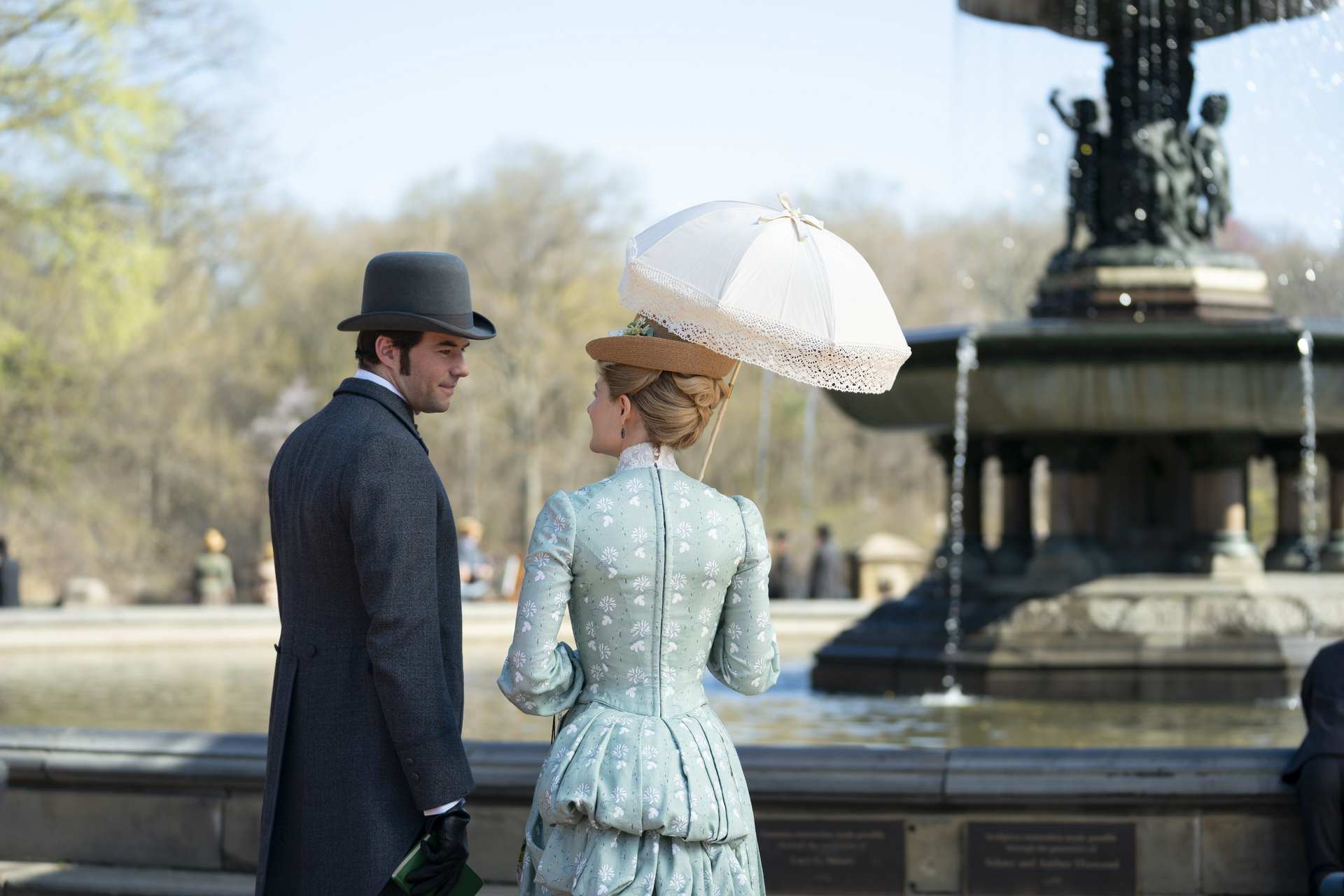
Mysteries are already stacking up, including why Peggy (Denée Benton) wants to meet with Marian’s lawyer Tom (Thomas Cocquerel). This off-screen conversation takes place in front of Bethesda Fountain in Central Park, which includes a brief history lesson for anyone wanting to avoid a Wiki search. Marian, who was also present, calls Tom out for parroting the guidebook, which is meant to be flirtation but it only makes the script sound clumsier. Later, during the Russell dinner, the references to real people are smoother and less contrived; the world-building is stronger in these moments.
As with the premiere, Bertha (Carrie Coon) and George Russell (Morgan Spector) are firing on all cylinders with their ongoing quest to take Manhattan. It is a captivating team-up resulting from the fiery chemistry between Coon and Spector that stems from George’s continued support of his wife’s endeavors. Yes, he benefits from her social success — he is inclined to need a few favors to further his railroad empire — but he is also furious that Bertha continues to be spurned by these women. Once again they want her money but won’t let her participate in the charity fundraising bazaar that Agnes refers to as sounding "dull enough to be respectable.”
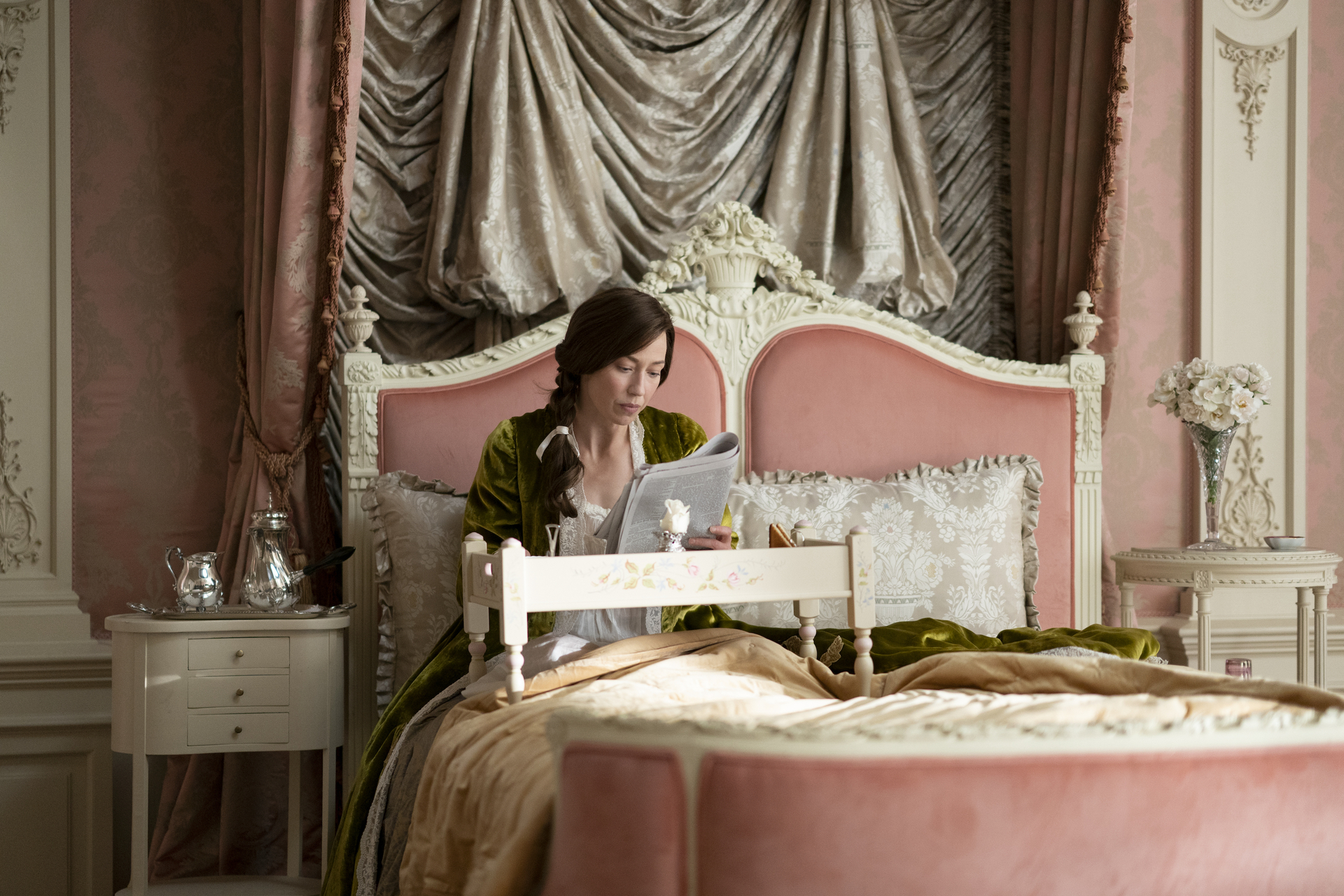
Mrs. Anne Morris (Katie Finneran) cannot be swayed to take up Bertha’s generous offer to use their as-yet untouched ballroom when the original venue falls through — the double booking is no doubt the work of George Russell. The announcement in the newspaper causes Bertha to throw her breakfast tray in a style that suggests she is auditioning for the 19th century The Real Housewives of New York City, yet George still has an ace up his sleeve.
Another difference between the Russells and the other couples is they are working in tandem whereas Mrs. Morris won’t bow to her husband’s suggestion that they use the free ballroom. George has got everything he needs from Mr. Morris (Michel Gill), which leaves space for him to cause a spectacle at the charity bazaar. Last week, he made a point of saying that when someone turns him down twice there will be consequences and the same applies when his wife is on the receiving end of a rebuke.
Moments after Mrs. Astor (Donna Murphy) has opened the bazaar, George pulls a power move that effectively shuts the three-day event down while gifting more money than they likely would’ve raised. “This sort of stunt impresses everyone,” is Bertha’s response when Mrs. Morris tries to shame her. Costume designer Kasia Walicka-Maimone highlights Bertha’s ambition (and wealth) in her gowns and her peacock feather embellished daytime attire emphasizes Bertha’s refusal to be cowed into submission. It is satisfying to see the society gatekeepers be taught this lesson and it is no surprise to see Mrs. Chamberlain (Jeanne Tripplehorn) look so amused at this unfolding scene.
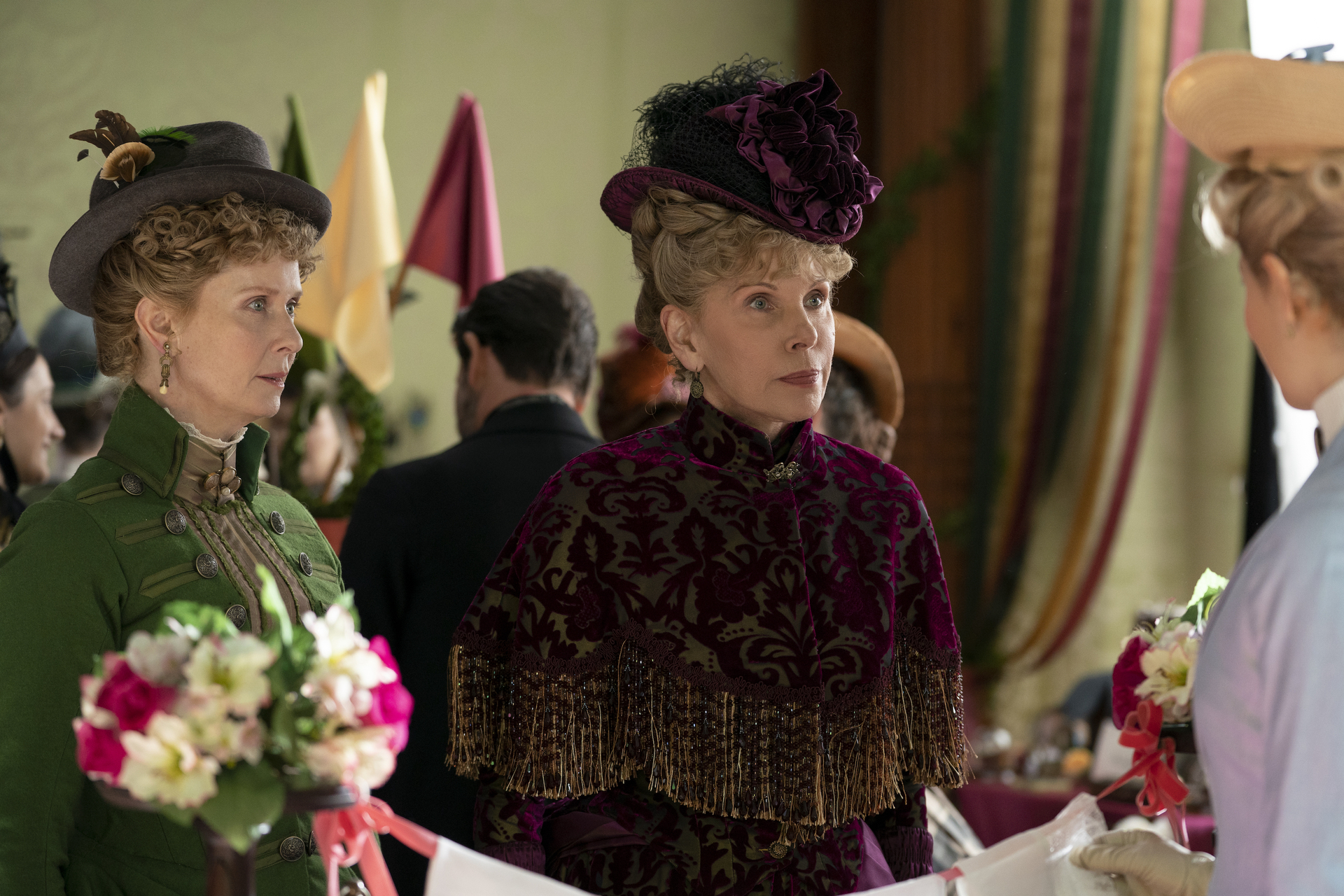
Before the Russells made their intentions clear, Mrs. Chamberlain stops by Marian’s stall and invites her to call on her if she so wishes. We still don’t know what Mrs. Chamberlain’s so-called crime is but Agnes makes her feelings clear about the “tainted money” that Marian has taken. In the pecking order, Bertha is above Mrs. Chamberlain, especially now that Mrs. Astor is aware of her husband’s prowess.
When the society maven leaves so does everyone else because this set is nothing if not impressionable. “Yesterday I would have said he was nobody, but today I am obliged to concede he is someone to be reckoned with,” Mrs. Astor observes about George to her daughter, and she appears to be impressed by his gumption. Agnes can throw out all the snobby one-liners she wishes — which Baranski is infinitely watchable doing — but money is talking and not in the way she wanted.
The main event is upstairs, but the downstairs strife helps fuel Marian’s story. The gambling debt of the cook Mrs. Bauer (Kristine Nielsen) leads to a heart-to-heart between Marian and her more sympathetic aunt, Ada (Cynthia Nixon). Ada is thankfully not as naive as she first seemed, as “Money Isn’t Everything” peels back some of the layers of her dynamic as the youngest sibling. It isn’t exactly breaking the wheel, but it shows The Gilded Age isn’t only concerned with the shiny surface.
Emma Fraser spends most of her time writing about TV, fashion, and costume design; Dana Scully is the reason she loves a pantsuit. Words can also be found at Vulture, Elle, Primetimer, Collider, Little White Lies, Observer, and Girls on Tops. Emma has a Master’s in Film and Television, started a (defunct) blog that mainly focused on Mad Men in 2010, and has been getting paid to write about TV since 2015. It goes back way further as she got her big start making observations in her diary about My So-Called Life’s Angela Chase (and her style) at 14.
